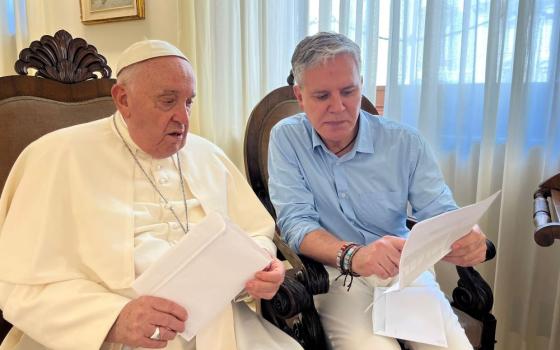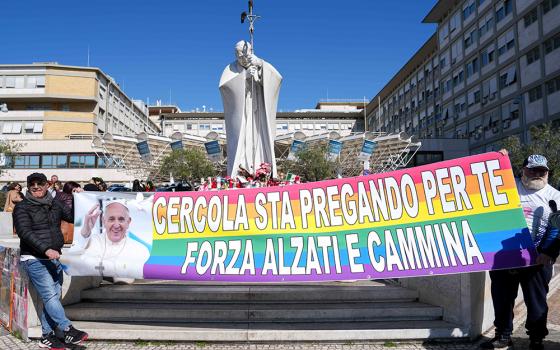
Pope Francis delivers his blessing as he recites the Angelus noon prayer from the window of his studio overlooking St. Peter's Square, at the Vatican, Sunday, Nov. 24, 2024. (AP/Andrew Medichini)
To ensure artificial intelligence is developed and used in an ethical, transparent and responsible manner in Vatican City State, the city-state governor's office has released a set of guidelines on AI, which will be followed by new laws and regulations.
"The guidelines highlight the importance of a balanced and mindful approach in regulating artificial intelligence and will act as a 'compass'" and a framework for "future regulatory actions" regarding AI technology, the city-state said in a Dec. 23 press release on vaticanstate.va. The guidelines went into effect Jan. 1.
The president of the governor's office will also set up a five-person AI commission, presided over by the secretary-general of the governing office, to oversee the implementation and regulation of AI within Vatican City State.
Specifically, the commission will: prepare the proposed laws and regulations; provide input and opinions about the use of AI systems and models; and monitor the activities of AI systems and models and their impact on individuals, employment and the environment.
"The key principle is that technological innovation cannot and should never overtake or replace human beings," the press release said. "On the contrary, it should serve humanity, and support and respect human dignity," individual rights and freedom.
"The aim is to make artificial intelligence a resource that, if properly regulated, will be able to foster well-being and progress, without compromising ethical and social principles," it added.
The 13-page policy, released as a decree by the pontifical commission governing Vatican City State, covers a series of general ethical principles, specific guidelines for certain offices and prohibitions.
The bans include prohibitions against AI technology and practices that: cause discrimination; harm individuals physically or psychologically through subliminal manipulation; exclude people with disabilities; create social inequalities; demean human dignity; violate fundamental human rights; compromise Vatican City State security and public order; encourage criminal conduct; and conflict with "the mission of the pope, the integrity of the Catholic Church and the proper operation" of the Vatican entities overseen by the governor's office.
Advertisement
The office oversees those who work in administration and human resources, the Vatican Museums, the gardeners, trash collectors, firefighters, police, post office employees as well as those who work for the Vatican health service, pharmacy and Vatican court system. The guidelines and future regulations also cover third-party suppliers, operators and professionals who are hired temporarily.
Some offices were given specific guidelines pertaining to their field, such as offices dealing with: personal data and data processing; scientific research and healthcare; copyright protection; cultural heritage; maintenance and services; administrative procedures; human resources and labor practices; judicial activities; and security.
Some examples included: mandating that all texts, music, photos, audiovisual and radio content that have used AI systems and models in their creation or reproduction be labeled with the acronym AI; and insisting that patients being treated by the Vatican's health care service must be informed about the use and application of AI in their care.
While most offices have been given the green light to adopt AI in ways that streamline and facilitate human labor, the guidelines specified that the Vatican's judicial offices may only use AI "for the organization and simplification" of its research and work. Interpretation of the law, analysis of the facts and evidence of a case, and deciding on sentencing or other measures must never be handled by AI as these tasks are "reserved exclusively for the magistrate."
Laws and regulations applying the guideline's principles were to be adopted within the current calendar year, the press release said.






